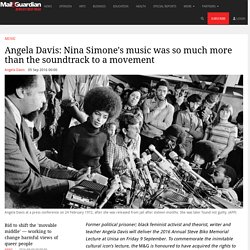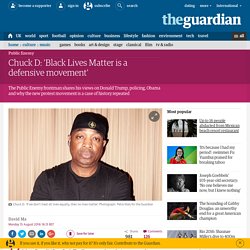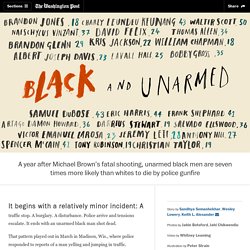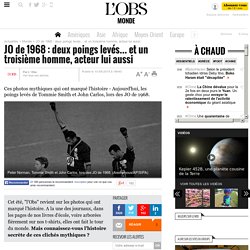

Angela Davis: Nina Simone's music was so much more than the soundtrack to a movement. Former political prisoner; black feminist activist and theorist, writer and teacher Angela Davis will deliver the 2016 Annual Steve Biko Memorial Lecture at Unisa on Friday 9 September.

To commemorate the inimitable cultural icon’s lecture, the M&G is honoured to have acquired the rights to publish one of Davis’ most recent essays, written as the liner notes to the new album Nina Revisited: A Tribute to Nina Simone. Chuck D: 'Black Lives Matter is a defensive movement' Public Enemy’s Chuck D has never pulled his punches.

Since the group’s debut album Yo! Bum Rush The Show was released 30 years ago, the group has addressed social injustice and written songs that have provided the soundtrack to protest and resistance around the world. He’s stayed active for the better part of three decades and built a career on telling truths, often loudly. Not just in his music, but his writings, speeches and university lecture series. Ahead of a tour with his new group Prophets of Rage – which includes members of Cypress Hill and Rage Against The Machine – the Guardian spoke with Chuck on current matters of the state, his frustrations, Barack Obama and the current political landscape.
1990 : Quand Public Enemy faisait trembler la France. Tout au long de cette année, VICE et l’INA se penchent sur les archives télé des émissions marquantes du PAF.

Pour le premier article Noisey de cette rubrique, nous nous sommes intéressés à la venue de Public Enemy à Paris en 1990, entre polémiques, cordons de CRS et hystérie médiatique. Novembre 1990. Motown: The Sound of Young America – in pictures. 'We do this for Mike Brown': a year on, Ferguson is a wound that won't heal. An unarmed black man is shot dead by a white police officer following a brief struggle at a car in a midwestern American city in the summertime.

The police tell one version; his friends and family give another. But this year the script was not the same. The reaction to the killing last month of Samuel DuBose in Cincinnati suggested that so much had changed since the death of Michael Brown in Ferguson, Missouri, last August. Officer Ray Tensing’s false claim that DuBose dragged him along the street with his car before being shot in the head was met with public scepticism and cautious media coverage. Authorities promptly released damning video footage from police body cameras. By then, Cincinnati police chief Jeffrey Blackwell had articulated the thinking behind this brisk and apologetic response. Ferguson: Police still killing unarmed black men one year later. “I’ll never forget his face,” Owens said.

“I could see his eyes, that he was placed in a situation where he didn’t know how to act, just to get the hell out of the way, and get his dog out of the way. He had nowhere to go. The car was headed directly at him.” Owens said the shooting is “kind of like a fog. . . . Ferguson and beyond: how a new civil rights movement began – and won't end. Mike Brown should be alive today.

He should be home from his first year at college, visiting friends and enjoying summer as he prepares to return to campus. The movement began one year ago as Brown’s body lay in the street of Canfield Drive here in Ferguson, Missouri, for four and a half hours. It began as the people of St Louis came out of their homes to mourn and to question, as the people were greeted by armed and aggressive officers. And the movement was sustained by a spirit of resistance that refused to be silent, that refused to cower, that refused to bow to continued hostility from the state. America's Slums Are Getting Worse As More People Live in Concentrated Poverty. Business After falling in the 1990s, the number of poor people living in high-poverty areas has been growing fast.

Martin Luther King's first I Have a Dream speech recording unearthed. JO de 1968 : deux poings levés... et un troisième homme, acteur lui aussi. Cet été, "l'Obs" revient sur les photos qui ont marqué l'histoire.

A la une des journaux, dans les pages de nos livres d'école, voire arborées fièrement sur nos t-shirts, elles ont fait le tour du monde. Mais connaissez-vous l'histoire secrète de ces clichés mythiques ? Un geste de défi 1968, année césure. Même si l'événement se veut apolitique, les Jeux olympiques de Mexico ne sont pas épargnés par la bourrasque de révolte qui souffle alors. Aux Etats-Unis, le renouveau du « Black Power » Etats-Unis : l’état d’urgence reconduit à Ferguson. August 12, 1965: The Watts Section of Los Angeles Riots. Bessie Smith – Backwater Blues.
« La grande Bessie qui chantait le blues / Est morte à Memphis dans le Tennessee / Entre un hôpital interdit aux Noirs / Et un hôpital réservé aux Blancs » Ces vers ouvraient un long texte dans la première édition d’une anthologie de la poésie française contemporaine publiée par Bernard Delvaille dans les années 70.

C’est une légende, qui comme beaucoup de légendes n’est pas très éloignée de la réalité. Née en 1894 à Chattanooga dans le Tennessee, dans une famille pauvre et religieuse, Bessie Smith avait déjà perdu ses deux parents à l’âge de neuf ans. C’est en mendiant sa vie qu’elle a commencé à chanter et à danser, encore enfant, dans les rues de Chattanooga, accompagnée à la guitare par son frère. Gil Scott-Heron: the revolution lives on. When Gil Scott-Heron died in May 2011, Public Enemy’s Chuck D hailed him as “the manifestation of the modern word”.

At his funeral, Kanye West performed Lost in the World/Who Will Survive in America, which sampled his spoken word . During the attempt to overthrow Egyptian president Hosni Mubarak, Scott-Heron’s most famous track, The Revolution Will Not Be Televised, was playing in Tahrir Square.